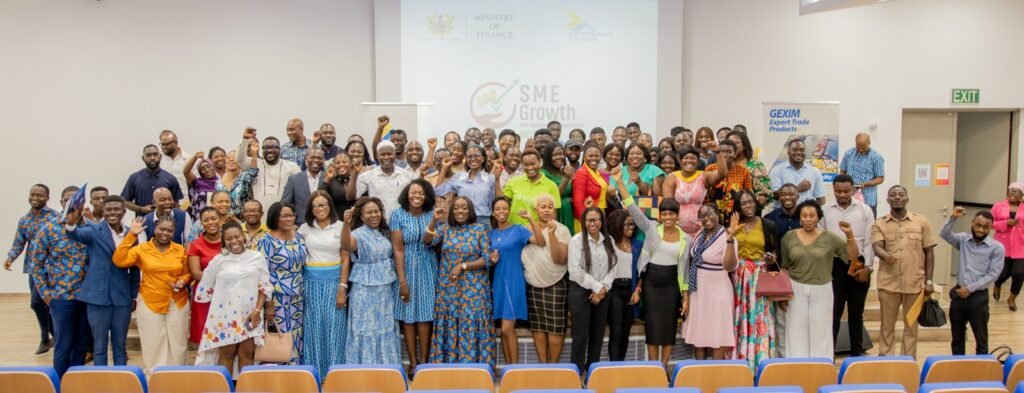News
GEXIM supports SMEs through capacity building programme

The Ghana EXIM Bank (GEXIM), has announced a support package for Small and Medium Enterprises(SMEs) through its capacity programme.
This falls under the SME Growth and Opportunity programme launched by the Ministry of Finance which offers a comprehensive package of financial and technical support, including capacity-building sessions, to address the critical funding constraints faced by SMEs.
Speaking at the Ghana EXIM Bank Stakeholder Session with SMEs on Thursday September 26, at the Trade Fair House in Accra, Rosemary Beryl Archer, Deputy Chief Executive Officer of Ghana Exim Bank, said, the government’s 10 points industrialization agenda has SME development at heart.
She said, on Tuesday July 16, 2024, the President of the Republic, His Excellency Nana Addo Dankwa Akufo-Addo launched the SME Growth and Opportunities Programme in Accra.
According to her, it is a ground-breaking initiative which seeks to assist Ghanaian SMEs to scale up and build their capacity to make them sustainable and compete favourably in the international marketplace. The Bank is a strategic partner.
She further noted that “Today, we want to share with you our plan for Micro and SMEs on our special initiative under the SME GO Programme to strategically position your businesses and take you to the next level. We want to share ideas and identify ways of supporting your businesses to grow. We are here for you, so please feel free to engage with us.”
She added that they want to develop them to grow into the international market, adding that if they contribute 70 percent of the GDP, then there is the need for them to be supported.
According to her, the mandate of the Bank is to support and develop trade between Ghana and other countries, overseas investments by Ghanaian Companies and eliminate critical market failures in the Ghanaian economy thereby making Ghana competitive in the global marketplace.
The deputy CEO of GEXIM Bank noted that financing from the Ghana EXIM Bank aims at key benchmarks derived from development instead of commercial objectives. These are employment creation, value addition through production, efficiency and foreign exchange revenue potential.
The Head of SME Banking at GEXIM, Bright Darko said as part of the programme some funds have been set aside under Capacity Building for some micro and small businesses who will need grants to support their operations.
He said it was why they met those businesses to try and explain to them what the programme was all about as well as how they could apply in line with the requirements.
He said as a department, they have seen access to finance as the main challenge of the SMEs because the commercial banks shy away from them.
Against this backdrop, Mr.Darko said, this facility has specially been put together to assist SMEs struggling to get funding from the commercial banks, adding that they are critical to the economy.
Additionally, he said, they would put in place monitoring systems to ensure that the grants are put to good use.
He also announced that the bank is on course of setting up a processing facility by June, 2025
After the meeting an application form was made available for them to start applying.
The application will run from now till the end of October, and within a period of 30 days of application, one is expected to get the fund.
The participants expressed appreciation to the government and the bank for coming to their aid to enhance their capacity.
They promised to put the support to good use,
By Edem Mensah-Tsotorme
Entertainment
Kwaisey Pee honours promise, donates GHC50,000 to Korle-Bu Paediatric Oncology Unit

Ghanaian music icon, Akwasi Poku Addae, known in Showbiz circles as Kwaisey Pee has honoured his promise to children suffering from cancer.
Ahead of his 25th anniversary event held at the D’ Icon Event Centre at East Legon last year, he made a promise to donate some funds to children suffering from cancer.
True to his word, the musician has recently made a donation of GHC50,000 to the Paediatric Oncology Unit of the Korle-Bu Teaching Hospital.
He told the Ghanaian Times that children are so dear to him, and was optimistic the support would go a long way too impact lives.
The music dynamo also promised that the gesture will not be the last,” it will be a continuous feature from me.”
He also called on Ghanaians home and abroad to lend a helping hand to children suffering from cancer.
According to him, children with cancer have many needs, and a helping hands will go a long way ease the suffering.
“Cancer treatment is very expensive, and leaving that to parents of the children alone, will be a huge burden, with support from you and myself, we can make some changes in other people’s lives,” he concluded.
By Edem Mensah-Tsotorme
News
Dickson Kyere Duah, Kwadwo Poku clash over government funding for World Cup participation

A disagreement has emerged between Member of Parliament for Berekum West, Dickson Kyere-Duah, and energy consultant Kwadwo Poku over government funding for Ghana’s participation in the 2026 FIFA World Cup.
The debate centred on government’s decision to budget about 13 million dollars to support the national team, even though FIFA is expected to provide an appearance fee of about 10.5 million dollars if Ghana qualifies for the tournament.
During the discussion on Joys news , Mr Poku questioned why the government should allocate such an amount when FIFA already provides funds to participating countries.
According to him, the appearance fee alone should help cover some of the country’s expenses.
He argued that if FIFA is giving Ghana 10.5 million dollars simply for qualifying for the tournament, it raises questions about the need for the government to appropriate additional funds.
Mr Kyere Duah, however, explained that the government’s allocation was part of advance planning captured in the national budget even before the final qualification results were known.
He noted that the budget for the tournament period was prepared in November 2025, when it was not certain that Ghana would qualify.
He stressed that budgeting does not automatically mean the entire amount will be spent.
According to him, the funds are meant to prepare the team from the start of the competition period until the end of the tournament.
Mr Kyere Duah explained that if the team exits the tournament early, the full amount allocated in the budget will not be used.
Mr Poku maintained that FIFA already provides financial support to teams for participating in the World Cup and insisted that the government must clearly justify additional spending.
The discussion extended to the role of the Ghana Football Association in managing the national teams.
Mr Poku described the association as a private institution and argued that FIFA also operates as a private body that does not allow government interference.
He explained that FIFA provides funds to teams to support their preparation and participation in the tournament.
Mr Kyere Duah, however, maintained that national teams represent the country and require government support to operate effectively.
By: Jacob Aggrey

 News1 week ago
News1 week agoFinance Minister outlines new gold policies to boost reserves and curb smuggling

 News1 week ago
News1 week agoSam George launches the 2026 Meteorological Awareness Month; presents the 2026 seasonal forecast for southern Ghana

 Hot!1 week ago
Hot!1 week agoBreaking: Footballer who killed two children in Abesim handed lifetime sentence






